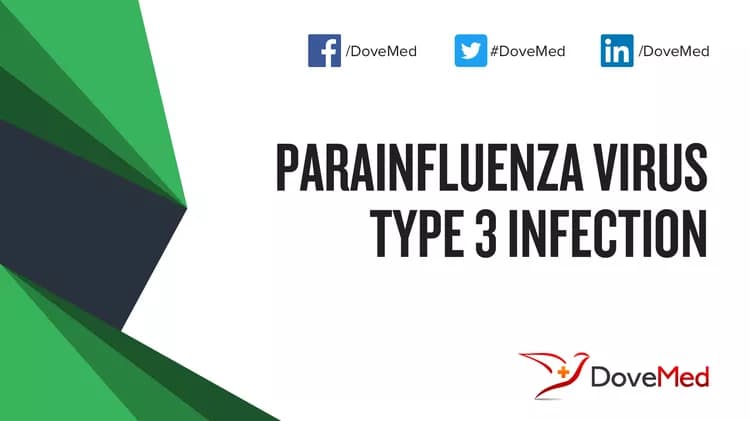What are the other Names for this Condition? (Also known as/Synonyms)
- HPIV Type 3 Infection
- Human Parainfluenza Virus Type 3 Infection
- PIV3 Infection
What is Parainfluenza Virus Type 3 Infection? (Definition/Background Information)
- Parainfluenza Virus Type 3 Infection is caused by parainfluenza virus type 3, a member of a group of common viruses known as human parainfluenza viruses (HPIV) that cause a variety of respiratory illnesses
- Symptoms usually develop between 2 and 7 days from the time of exposure and typically resolve in 7-10 days. Symptoms may include fever, runny nose, and cough
- HPIV-3 can also cause bronchiolitis, bronchitis, and pneumonia. Infants and young children are particularly susceptible to HPIV-3 Infections, though older adults and those with a weakened immune system are also at risk for complications
- HPIVs are usually spread from an infected person to others through coughing, sneezing, and/or touching. There is currently no vaccine to protect against parainfluenza virus infections
- Most HPIV infections resolve on their own and do not require special treatment, though medical intervention may be necessary for severe breathing problems
- Most adults have antibodies against parainfluenza but can get repeat infections
(Source: Parainfluenza Virus Type 3; Genetic and Rare Diseases Information Center (GARD) of National Center for Advancing Translational Sciences (NCATS), USA.)
Who gets Parainfluenza Virus Type 3 Infection? (Age and Sex Distribution)
- Parainfluenza Virus Type 3 Infection is a rare infectious condition
- The presentation of symptoms may occur at any age, although infants and young children and older adults and those with weak immune systems are more susceptible
- Both males and females may be affected
- Worldwide, individuals of all racial and ethnic groups may be affected
What are the Risk Factors for Parainfluenza Virus Type 3 Infection? (Predisposing Factors)
The risk factors for Parainfluenza Virus Type 3 Infection may include the following:
- Age: Young children and elderly adults are more susceptible to this infection
- A weak immune system, such as following an organ transplantation or chemotherapy, or those infected with HIV
- Spring and early summer months, when possible exposure to HPIV3 is the highest
- Contact with an infected individual
It is important to note that having a risk factor does not mean that one will get the condition. A risk factor increases one’s chances of getting a condition compared to an individual without the risk factors. Some risk factors are more important than others.
Also, not having a risk factor does not mean that an individual will not get the condition. It is always important to discuss the effect of risk factors with your healthcare provider.
What are the Causes of Parainfluenza Virus Type 3 Infection? (Etiology)
- Parainfluenza Virus Type 3 Infection is caused by a pathogen belonging to the family of human parainfluenza viruses (HPIVs), specifically parainfluenza virus type 3 (or PVI3)
- The infection spreads via contact with the viral particles contained in the infected individual’s cough/respiratory droplets
- Or, through direct personal contact, such as by handshakes or hugging, or touching objects used/handled by the affected individuals
What are the Signs and Symptoms of Parainfluenza Virus Type 3 Infection?
The signs and symptoms of Parainfluenza Virus Type 3 Infection may begin 2-7 days following exposure to the virus. It may include the following:
- Fever
- Runny nose
- Cough
- When the lungs and airways are affected, it can lead to bronchitis and bronchiolitis
How is Parainfluenza Virus Type 3 Infection Diagnosed?
Parainfluenza Virus Type 3 Infection is diagnosed on the basis of the following information:
- Complete physical examination
- Thorough medical history evaluation
- Assessment of signs and symptoms
- Laboratory tests including blood and sputum culture
- Imaging studies
- Biopsy studies, if necessary
Many clinical conditions may have similar signs and symptoms. Your healthcare provider may perform additional tests to rule out other clinical conditions to arrive at a definitive diagnosis.
What are the possible Complications of Parainfluenza Virus Type 3 Infection?
The complications of Parainfluenza Virus Type 3 Infection may include:
- Secondary bacterial infections
- Recurrence of HPIV3 infection
- Pneumonia
Complications may occur with or without treatment, and in some cases, due to treatment also.
How is Parainfluenza Virus Type 3 Infection Treated?
Generally, no treatment is necessary for Parainfluenza Virus Type 3 Infection. The condition usually gets better within a week to 10 days of symptom-onset.
- If necessary, over-the-counter painkillers or fever-reducing medications may be prescribed for relief from symptoms
- Rest and plenty of fluid intake may be advised for those with HPIV3 Infection
- If complications, such as pneumonia, develop due to secondary bacterial infection, then antibiotics may be prescribed
How can Parainfluenza Virus Type 3 Infection be Prevented?
Parainfluenza Virus Type 3 may preventable by adhering to the following measures:
- Avoiding contact with infected individuals
- Washing hands frequently with soap and water, and definitely before eating or touching one’s face or mouth
- Staying home to avoid infection spread
- If infected, covering mouth and nose while sneezing or coughing
- Cleaning and disinfecting commonly touched surfaces, such as doorknobs and computer keyboards, as necessary
What is the Prognosis of Parainfluenza Virus Type 3 Infection? (Outcomes/Resolutions)
- The prognosis of Parainfluenza Virus Type 3 Infection is good, since the condition resolves within 7-10 days without treatment, following the manifestation of symptoms
- However, complications may arise in immune-compromised individuals and very young children. In such cases, the prognosis may be assessed on a case-by-case basis
Additional and Relevant Useful Information for Parainfluenza Virus Type 3 Infection:
The following DoveMed website link is a useful resource for additional information:
Related Articles
Test Your Knowledge
Asked by users
Related Centers
Related Specialties
Related Physicians
Related Procedures
Related Resources
Join DoveHubs
and connect with fellow professionals


0 Comments
Please log in to post a comment.